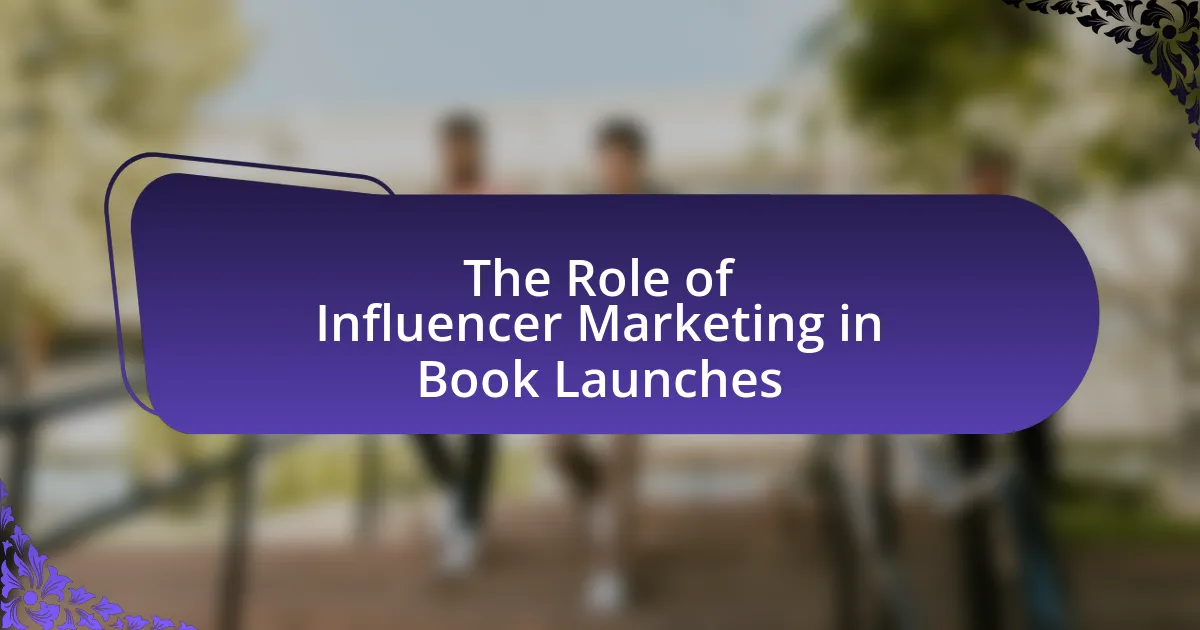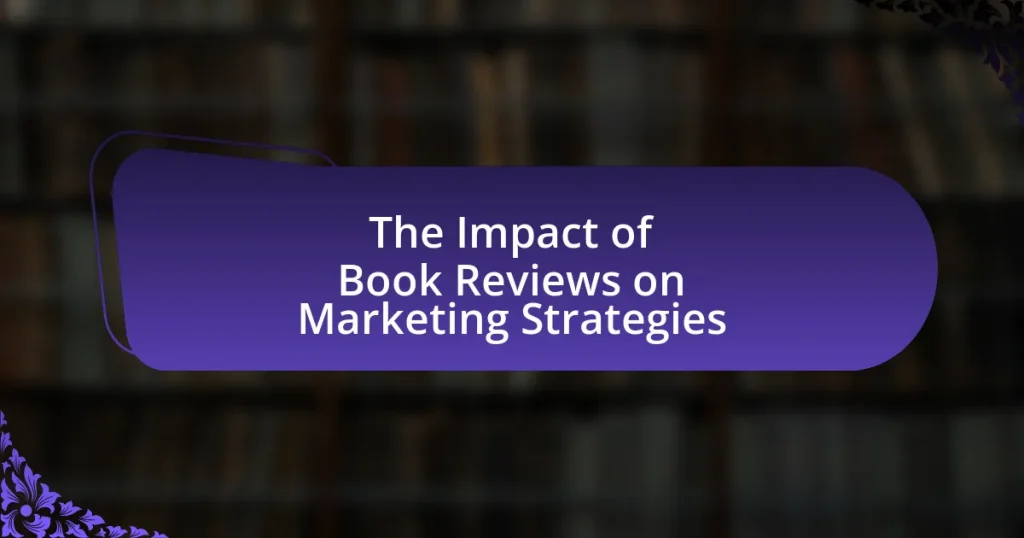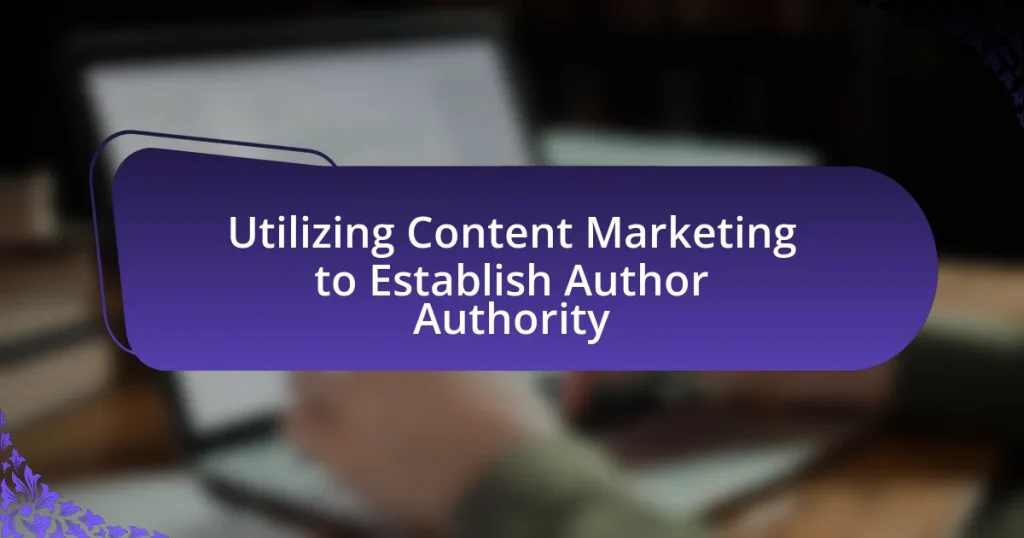The article examines the critical role of influencer marketing in book launches, highlighting how it leverages the reach and credibility of influencers to enhance visibility and drive sales. It discusses key strategies for effective influencer collaborations, including the importance of selecting relevant influencers, creating engaging content, and utilizing social media platforms like Instagram and TikTok. The article also addresses the impact of influencer marketing on audience engagement, the effectiveness of micro-influencers compared to macro-influencers, and best practices for authors to implement successful campaigns. Additionally, it outlines common challenges authors face and offers practical tips for maintaining long-term relationships with influencers.
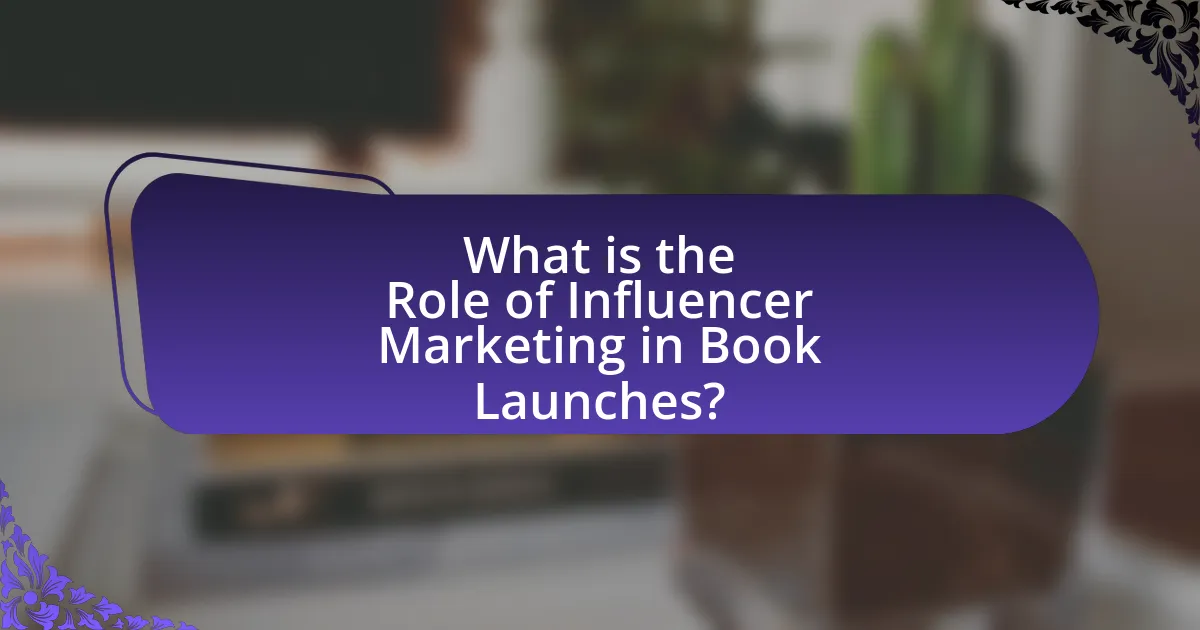
What is the Role of Influencer Marketing in Book Launches?
Influencer marketing plays a crucial role in book launches by leveraging the reach and credibility of influencers to promote new titles. Influencers can generate buzz and excitement around a book, leading to increased visibility and sales. For instance, a study by the Digital Marketing Institute found that 49% of consumers depend on influencer recommendations when making purchase decisions, highlighting the effectiveness of this marketing strategy. By collaborating with influencers who align with the book’s themes or target audience, authors and publishers can tap into established communities, enhancing engagement and driving pre-orders or sales during the launch period.
How does influencer marketing impact the visibility of a book during its launch?
Influencer marketing significantly enhances the visibility of a book during its launch by leveraging the established audiences of influencers to reach potential readers. When influencers promote a book, they create authentic endorsements that can lead to increased awareness and interest among their followers. For instance, a study by the Digital Marketing Institute found that 49% of consumers depend on influencer recommendations when making purchase decisions, indicating that influencer endorsements can effectively drive book sales and visibility. Additionally, influencers often share content across multiple platforms, amplifying the book’s reach and generating buzz that traditional marketing methods may not achieve.
What are the key strategies used in influencer marketing for book launches?
Key strategies used in influencer marketing for book launches include leveraging social media platforms, engaging with niche influencers, and creating authentic content. Social media platforms like Instagram and TikTok are essential for reaching target audiences, as they allow for visual storytelling and direct engagement. Collaborating with niche influencers who have a dedicated following in specific genres ensures that the book reaches an audience that is already interested in similar content. Authentic content, such as personal reviews, unboxing videos, and live readings, fosters trust and encourages followers to engage with the book. According to a study by the Digital Marketing Institute, 49% of consumers depend on influencer recommendations, highlighting the effectiveness of these strategies in driving book sales and visibility.
How do influencers choose which books to promote?
Influencers choose which books to promote based on alignment with their personal brand, audience interests, and the book’s relevance to current trends. They often evaluate the book’s genre, author reputation, and potential for engagement with their followers. For instance, a lifestyle influencer may select self-help or wellness books that resonate with their audience’s preferences, while a book-focused influencer might prioritize literary fiction or popular bestsellers. Additionally, influencers may consider partnerships with publishers or authors, assessing the promotional materials and incentives offered. This strategic selection process ensures that the books they promote are likely to generate interest and engagement, ultimately benefiting both the influencer and the book’s visibility in the market.
Why is influencer marketing becoming essential for authors and publishers?
Influencer marketing is becoming essential for authors and publishers because it effectively reaches targeted audiences through trusted voices. This marketing strategy leverages the established credibility and engagement of influencers, allowing authors and publishers to promote their books to specific demographics that are more likely to convert into readers. According to a 2021 survey by the Digital Marketing Institute, 49% of consumers depend on influencer recommendations, highlighting the significant impact influencers have on purchasing decisions. This trend underscores the necessity for authors and publishers to integrate influencer marketing into their promotional strategies to enhance visibility and drive sales.
What advantages does influencer marketing provide over traditional marketing methods?
Influencer marketing offers greater engagement and authenticity compared to traditional marketing methods. Influencers have established trust with their audiences, leading to higher conversion rates; for instance, studies show that influencer marketing can yield an ROI of up to 11 times higher than traditional advertising. Additionally, influencer marketing allows for targeted outreach, as brands can collaborate with influencers whose followers align with their target demographic, enhancing the effectiveness of campaigns. This targeted approach contrasts with traditional marketing, which often casts a wider net with less precision.
How does influencer marketing enhance audience engagement for book launches?
Influencer marketing enhances audience engagement for book launches by leveraging the established trust and reach of influencers to create authentic connections with potential readers. Influencers can generate buzz through personalized content, such as reviews, unboxings, and live readings, which resonate with their followers. According to a study by the Digital Marketing Institute, 49% of consumers depend on influencer recommendations, indicating that influencers can significantly impact purchasing decisions. This engagement is further amplified by social media platforms, where influencers can interact directly with their audience, fostering a sense of community around the book launch.
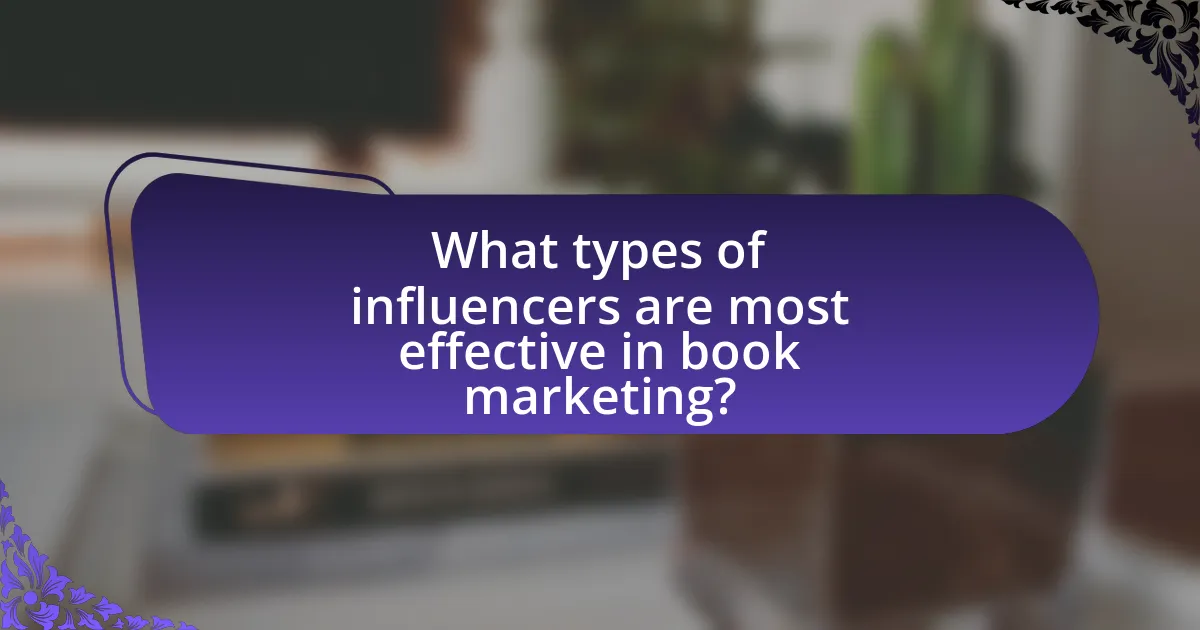
What types of influencers are most effective in book marketing?
Book bloggers and BookTubers are the most effective types of influencers in book marketing. These influencers have established audiences that trust their opinions on literature, making them valuable for promoting new releases. According to a study by the Book Marketing Society, 70% of readers are influenced by recommendations from book bloggers, while BookTube channels have seen significant engagement, with some channels amassing over 100,000 subscribers. This demonstrates that their reach and credibility can lead to increased visibility and sales for authors and publishers.
How do micro-influencers compare to macro-influencers in book launches?
Micro-influencers are often more effective than macro-influencers in book launches due to their higher engagement rates and targeted audiences. Research indicates that micro-influencers, defined as those with 1,000 to 100,000 followers, typically achieve engagement rates of 3% to 10%, compared to macro-influencers, who have engagement rates of 1% to 3%. This higher engagement translates to more authentic interactions and a greater likelihood of influencing purchasing decisions among their followers. Additionally, micro-influencers often cultivate niche communities, allowing for more tailored marketing strategies that resonate with specific reader demographics, thereby enhancing the effectiveness of book promotions.
What are the benefits of collaborating with niche influencers?
Collaborating with niche influencers offers targeted reach, enhancing engagement with specific audiences. Niche influencers possess dedicated followings that align closely with particular interests, allowing brands to connect with potential readers who are more likely to be interested in their books. According to a study by the Digital Marketing Institute, 70% of consumers are more likely to purchase a product recommended by a non-celebrity influencer, highlighting the effectiveness of niche influencers in driving sales. Additionally, niche influencers often have higher engagement rates, which can lead to increased visibility and credibility for the book being promoted.
How can authors identify the right influencers for their book genre?
Authors can identify the right influencers for their book genre by researching influencers who specialize in that specific genre and analyzing their audience engagement. This involves using social media platforms and influencer marketing tools to find individuals who have a strong following among readers of similar books. For instance, tools like BuzzSumo or Followerwonk can help authors assess an influencer’s reach and relevance based on metrics such as follower count, engagement rates, and content alignment. Additionally, examining the influencers’ previous collaborations and the types of books they promote can provide insights into their suitability for a particular genre.
What role do social media platforms play in influencer marketing for books?
Social media platforms are crucial in influencer marketing for books as they provide a direct channel for authors and publishers to reach targeted audiences through influencers. Influencers leverage their established follower bases on platforms like Instagram, TikTok, and Twitter to promote books, often resulting in increased visibility and sales. For instance, a study by the Book Industry Study Group found that 70% of readers discover new books through social media recommendations, highlighting the effectiveness of these platforms in influencing purchasing decisions. Additionally, social media allows for interactive engagement, enabling influencers to host live readings, Q&A sessions, and giveaways, which further amplify the reach and impact of book marketing campaigns.
Which platforms are most effective for book promotions through influencers?
Instagram and TikTok are the most effective platforms for book promotions through influencers. Instagram’s visual appeal and established book community, including features like Stories and Reels, allow influencers to engage audiences effectively. TikTok, particularly through the BookTok trend, has rapidly gained traction, with videos showcasing books leading to significant sales increases; for instance, titles featured on BookTok often see sales spikes of over 500%. These platforms leverage influencer reach and engagement to create authentic connections with potential readers, making them ideal for book marketing.
How can authors leverage social media trends to enhance their book launch?
Authors can leverage social media trends by engaging with popular platforms and utilizing trending hashtags to increase visibility during their book launch. By aligning their promotional content with current trends, authors can tap into larger conversations and reach a wider audience. For instance, using TikTok’s BookTok community, which has significantly influenced book sales, authors can create engaging short videos that resonate with readers. According to a report by NPD Group, books that gained traction on BookTok saw sales increases of up to 300%. This demonstrates that by strategically participating in social media trends, authors can enhance their book launch effectiveness and drive sales.
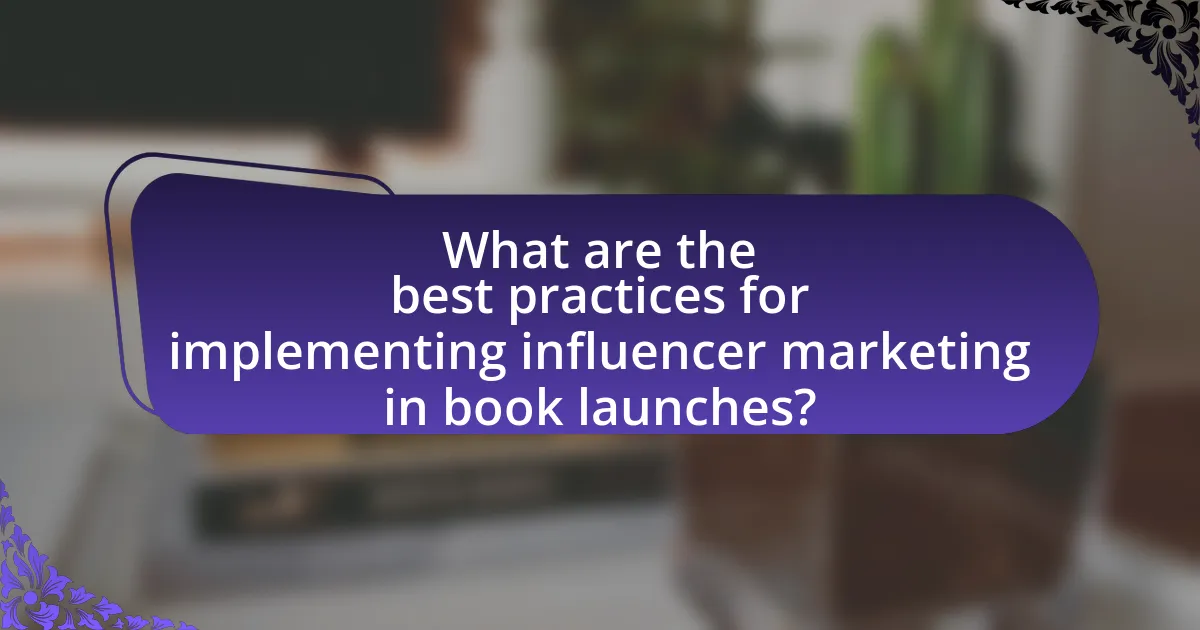
What are the best practices for implementing influencer marketing in book launches?
The best practices for implementing influencer marketing in book launches include selecting relevant influencers, establishing clear goals, and creating engaging content. Relevant influencers should have a genuine interest in the book’s genre and a following that aligns with the target audience, ensuring authentic promotion. Establishing clear goals, such as increasing pre-orders or social media engagement, helps measure the campaign’s success. Creating engaging content, such as book reviews, giveaways, or live readings, encourages interaction and excitement among followers. According to a study by the Digital Marketing Institute, campaigns that utilize influencers can yield up to 11 times the return on investment compared to traditional marketing methods, highlighting the effectiveness of these practices.
How can authors effectively collaborate with influencers for their book launches?
Authors can effectively collaborate with influencers for their book launches by identifying influencers whose audience aligns with their target readership and establishing clear communication regarding expectations and deliverables. This approach ensures that the influencer’s promotion resonates with their followers, increasing the likelihood of engagement and book sales. For instance, a study by the Digital Marketing Institute found that 49% of consumers depend on influencer recommendations, highlighting the potential impact of such collaborations. Additionally, authors should provide influencers with advanced copies of their books, enabling authentic reviews and personalized content creation, which can further enhance the promotional efforts.
What are the key elements of a successful influencer marketing campaign for books?
The key elements of a successful influencer marketing campaign for books include selecting the right influencers, creating engaging content, establishing clear goals, and measuring campaign effectiveness. Selecting influencers who align with the book’s genre and target audience ensures authenticity and relevance, as evidenced by a study from the Digital Marketing Institute, which found that 49% of consumers depend on influencer recommendations. Creating engaging content, such as book reviews, giveaways, and live readings, fosters interaction and excitement among followers. Establishing clear goals, such as increasing book sales or social media engagement, provides direction and focus for the campaign. Finally, measuring campaign effectiveness through metrics like engagement rates and sales figures allows for assessment and optimization of future campaigns.
How should authors measure the success of their influencer marketing efforts?
Authors should measure the success of their influencer marketing efforts by analyzing key performance indicators (KPIs) such as engagement rates, reach, and conversion rates. Engagement rates, which include likes, shares, and comments on posts related to the book, indicate how well the audience is interacting with the content. Reach measures the total number of unique users who see the influencer’s posts, providing insight into the campaign’s visibility. Conversion rates track the number of followers who take specific actions, such as purchasing the book or signing up for a newsletter, directly linked to the influencer’s promotion. According to a study by Influencer Marketing Hub, campaigns that effectively track these metrics can yield an average return on investment of $5.78 for every dollar spent, demonstrating the financial impact of successful influencer marketing.
What common challenges do authors face with influencer marketing?
Authors commonly face challenges such as identifying the right influencers, managing expectations, and measuring the effectiveness of influencer campaigns. Identifying the right influencers is crucial because authors need to ensure that the influencer’s audience aligns with their target readership; a mismatch can lead to ineffective marketing. Managing expectations is another challenge, as authors may have unrealistic views on the reach and impact of influencer collaborations, often expecting immediate sales boosts rather than gradual brand awareness. Finally, measuring the effectiveness of influencer marketing can be difficult, as authors may struggle to track conversions and engagement metrics accurately, making it hard to assess the return on investment. These challenges highlight the complexities authors encounter in leveraging influencer marketing for book launches.
How can authors overcome skepticism from influencers regarding their book?
Authors can overcome skepticism from influencers regarding their book by providing credible endorsements and demonstrating their expertise. Establishing a strong author platform, including a professional website and active social media presence, helps build trust. Additionally, sharing advanced reader copies (ARCs) allows influencers to evaluate the book’s quality firsthand, which can alleviate doubts. Research indicates that 70% of consumers trust online reviews from influencers, making it crucial for authors to engage with influencers who align with their genre and audience. By fostering genuine relationships and showcasing their work’s value, authors can effectively mitigate skepticism.
What strategies can authors use to maintain long-term relationships with influencers?
Authors can maintain long-term relationships with influencers by consistently engaging with them through personalized communication and collaboration. This involves regularly reaching out with updates about new projects, sharing relevant content, and expressing appreciation for their support. Research indicates that personalized interactions foster stronger connections; for instance, a study by the Harvard Business Review found that personalized communication increases engagement rates by up to 50%. Additionally, authors can collaborate on projects, such as co-hosting events or creating exclusive content, which not only benefits both parties but also reinforces the partnership. By prioritizing mutual value and open communication, authors can effectively sustain these relationships over time.
What practical tips can authors follow for successful influencer marketing in book launches?
Authors can achieve successful influencer marketing in book launches by identifying and collaborating with relevant influencers who align with their book’s genre and target audience. This approach ensures that the influencer’s followers are likely to be interested in the book, increasing the chances of engagement and sales. For instance, a romance novel author should partner with influencers who focus on romance literature or lifestyle content that resonates with potential readers.
Additionally, authors should provide influencers with personalized content, such as advanced reader copies or exclusive interviews, to create authentic promotional opportunities. Research indicates that 49% of consumers depend on influencer recommendations for their purchasing decisions, highlighting the effectiveness of this strategy.
Finally, authors should track engagement metrics and feedback from influencer campaigns to refine their marketing strategies for future launches, ensuring continuous improvement and adaptation to audience preferences.
